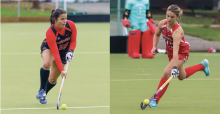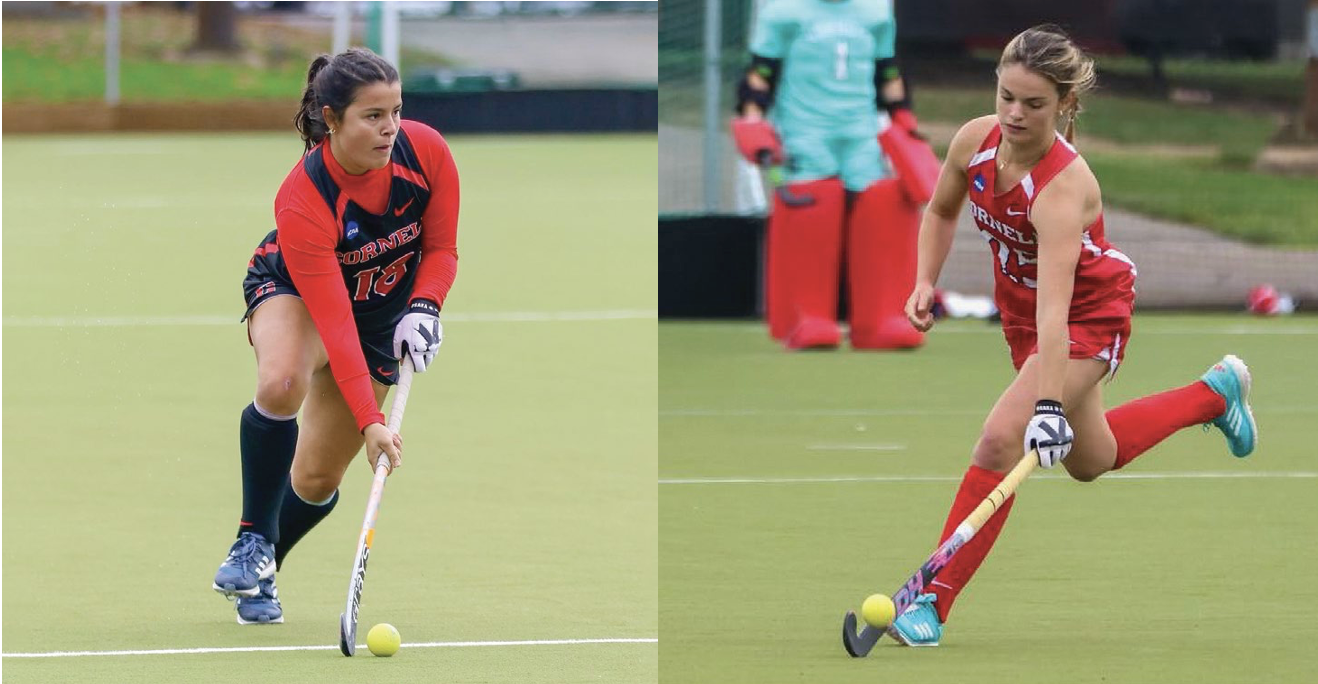
What inspired you to start playing field hockey?
Elizabeth: I grew up playing ice hockey and soccer. At GCDS, it was the first time I ever saw a field hockey stick. Field hockey combined my two childhood passions because it’s a lot like soccer, but you have a stick like ice hockey.
Olivia: I remember stepping onto the grass field at GCDS with a large bucket full of wooden sticks, and everyone got to choose the one they wanted. I had never played field hockey before, but I was given an opportunity to try a new sport to fill the time before the winter ice hockey season. I quickly realized that this was a sport I would continue to play.
Do you have any standout memories from your time at GCDS, on the GCDS FH team, or playing sports at GCDS in general?
Elizabeth: We used to play on grass fields in the middle of campus, and my friends would be pass by during our games, coming to and from their activities. It was a lot of fun to play our sport and be watched by all our friends. I also remember that during ice hockey season, we put all our gear on except for our skates and then walked down to Greenwich Skating Club. When it snowed we would just sled down the snowy hills with our bodies.
Olivia: I vividly remember the long walk in winter from the GCDS middle school, across the grass fields, down past the lower field, across the bridge, and through the lower fields to get to the rink. Back then, it felt like the most dreaded part of our routine, but looking back, it brings a smile to my face, especially recalling the moments when we were late and had to sprint the route.
Who at GCDS has had a significant impact on you?
Elizabeth: I came in fifth grade from Stanwich, my first teacher was Mr. Sinay. He was always a daily source of inspiration and calmness in the morning. I remember he would play music videos at the beginning and end of school. He would sing along, and so did I. Also, I had a coach, Ms. Fitzgerald, who I looked up to. She was so knowledgeable and enthusiastic about the game of ice hockey. She made me want to play sports longer to see where it took me.
Olivia: Mr. Helstein spread positivity and excitement in the athletic department. His constant smile and enthusiasm made everyone happy to be around him. He played a big part in making my athletic experience at GCDS truly special and contributed to my journey in sports being so fulfilling.
What attributes of TIGER PRIDE did you bring with you to Cornell and playing on the Canadian National Team (their dad is Canadian)?
Elizabeth: When I was a Tiger, everyone had this sense of resilience and teamwork. There was a pursuit of being the best and achieving excellence at GCDS. I’ve carried that into everything I’ve done. Those three things are very important, whether it’s sports or school—striving for the best but also working with the people around you. GCDS taught us that very well.
Olivia: To reach the level of field hockey required for Cornell and the Canadian National Team, I found that one of the most invaluable tools was the ability to create connections with teammates. Having played alongside hundreds of different individuals, I learned the importance of building meaningful connections on and off the field. The best way to make these connections, as simple as it may seem, is through the very same values of TIGER PRIDE: Being thoughtful, inclusive, generous, empathetic, and respectful. The more you’re able to trust your teammates, the stronger your performance becomes. A perfect example is last year when we, an unranked team that trusted each other, played Louisville, ranked #4, and, in a huge upset, defeated them 2-0.
What position do you play at Cornell?
Elizabeth: I play midfield or defense. We usually scout the teams before we play them, so I move around the field depending on what our scout recommends.
Olivia: I am primarily a side midfielder but sometimes play forward.
Do you have a special connection with your sister on the field?
Elizabeth: Definitely. A lot of people say it’s twin telepathy: just because we’re twins, we have this power, which I don’t think is entirely wrong, but I think it’s more that we’ve played sports with each other since day one. We always think a step ahead because we know each other so well. It definitely is a strategic advantage.
Olivia: Growing up, people would always say to us, “You guys have twin telepathy,” because we were always able to know where each other was without looking up. We have played on the same team in every sport for as long as I can remember, and we maybe did not exactly have actual twin telepathy, but when playing with someone for that long, you develop an understanding of each other’s movements and tendencies on the field. It’s less about seeing where she is but about the trust, connection, and confidence we have developed with each other.
I play both soccer and field hockey and find there are many strategic similarities between them. From positioning to communication, there’s no doubt my soccer career has made me a better field hockey player. What overlaps have you observed from your other sports that have helped you in field hockey?
Elizabeth: Each sport, specifically golf, teaches you a lot about your mindset in games and in life. You have to stay calm in stressful situations. So let’s say you make a bad shot, you have to think of the long term, how you’re going to beat your opponent and map out each shot you’re going to take next. That’s taught me a lot about staying calm in stressful situations.
Olivia: Despite the differences in playing surface and some rules, both sports share fundamental principles, including spatial awareness, timing, and strategic positioning. I definitely believe that being a multisport athlete helps build a diverse skill set and adaptability in different game situations. Additionally, exposure to different team dynamics enhances communication and teamwork, contributing to a more cohesive and effective performance.
How do you see the skills you’ve developed from sports assisting you in future endeavors?
Elizabeth: Field hockey is a very fast and dynamic game, and this has actually helped me with my internships and jobs. You’re in these one-on-one situations with your opponent—you play in these competitive environments and create that pass. This will help when working in dynamic fields, such as finance.
Olivia: Being an athlete has taught me the values of teamwork, leadership, discipline, and resilience. As a player on both Cornell University’s Varsity Field Hockey Team and the Women’s National Canadian Field Hockey Team, I have learned a great deal about myself and what it takes to succeed: how to compete, work as part of a team, the commitment required, and how to focus on and achieve long-term goals.
What advice would you give our budding athletes wanting to play sports in college?
Elizabeth: I have two pieces of advice. People nowadays specialize in one sport, but I recommend playing many sports. When the time comes to specialize, you can. I’ve learned so much from every sport, lessons I couldn’t have learned from just specializing in field hockey. Plus, I cherish all the memories and friends I’ve made along the way. My second piece of advice: the recruitment process can be very long and hard, and you encounter so many challenges and bumps in the road along the way, so it’s really important just to keep working through them and trying your best. Perseverance is key.
Olivia: You fell in love with your sport for a reason. The process of getting recruited and the sacrifices you have made to reach this point will be extremely frustrating at times, but remember why you started playing in the first place. Stay dedicated, work hard, and always believe in yourself. Embrace the journey, trust your abilities, and never lose sight of your passion for the game.
#gcdsalumni #gcdsathletics











.JPG&command_2=resize&height_2=85)





.jpg&command_2=resize&height_2=85)




